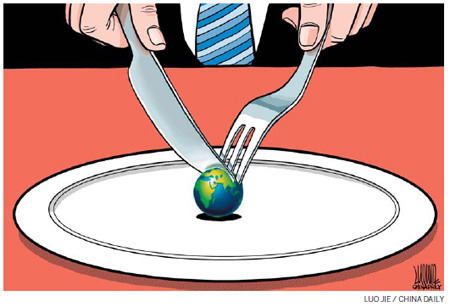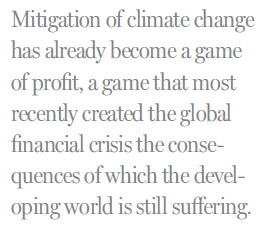Deal is hollow and false victory for climate change
Updated: 2010-12-17 10:24
By OP Rana (China Daily European Weekly)
The agreement hammered out by about 200 countries in Cancun is more about saving a negotiating process than saving the world.

The Cancun deal says all countries will cut emissions but unlike the Kyoto Protocol, which imposed binding cuts on developed countries, it has no mandatory clauses. The deal agrees to provide finance for countries that avoid emissions from deforestation and to potentially provide $30 billion for developing countries to adapt to climate change now and up to $100 billion later.
 |
The fact that negotiators from about 200 countries failed to agree on how far global emissions should be cut will set the world on course for 3.2 C warming 1.2 C above the red mark. Since the deal is not binding, countries could use the many loopholes in it to avoid making deep emission cuts.
But most of the negotiators hailed the deal as a breakthrough. Connie Hedegaard, the European Union's climate commissioner, saw the deal as a powerful motivating force. And Chris Huhne, Britain's energy secretary, said it would give industry more confidence to invest in low-carbon economies and encourage Europe to commit to a 30 percent cut in emissions by 2020.
Perhaps the only voices of reason were Bruno Sekoli, chair of the 54 nations' least developed bloc, and Pablo Solon, Bolivia's ambassador. Solon summarized the deal aptly when he said: "This is a hollow and false victory imposed without consensus, and its cost will be measured in human lives The experts know that we are right. This agreement won't stop temperatures from rising by 4 C and we know that 4 C is unsustainable." But Solon's voice was drowned in the din of cheer that arose in the plenary hall after the "deal" was agreed to.
Many may see Solon as pessimism personified. But what has optimism from the Rio de Janeiro conference in 1992 down to Bali in 2007 and Copenhagen in 2009 yielded?
Thanks to Wikileaks, we know how the United States brokered the "Copenhagen Accord" last year after blaming China (and India) for holding the world to ransom. US diplomatic cables reveal how Washington launched a secret global diplomatic campaign to destroy opposition to its Copenhagen Accord. Hammered out in the dying minutes of the Copenhagen climate conference and hailed as a "great success", but not adopted into the UN process, the controversial accord sought to solve many of Washington's problems.
Cancun's $100-billion potential pledge to developing countries should be seen in the light of what happened in Copenhagen, because it is in the Danish capital that the developed countries agreed to raise $100 billion a year by 2020 for the "Green Climate Fund". The Cancun conference just made it part of the formal UN process, thus putting the stamp of savior on the US.
The $100-billion pledge has been hailed as the best outcome of Cancun, especially because it will be largely managed by developing countries under the auspices of the UN, and not the World Bank. But the promise is only "potential" and comes with no specific pledge of cash. So where will the cash come from? Well, as the US said, most of it would come from the "private sector".
Let's travel back in time to the Rio de Janeiro conference in 1992, where developed countries promised to pay damages for their past sins but kept negotiating to defer their obligations. Hence, there is no guarantee that 18 years later they will keep their word, especially because the promise is not binding - it is only a potential pledge.
There is a vital link between the US' statement that most of the climate fund would come from the private sector and Chris Huhne's remark that the deal "would give industry more confidence to invest in low-carbon economies". The truth is that the private sector would be interested in the climate fund only if it can earn more than what it contributes to it. Are we looking at a new type of hedge fund? In all likelihood, yes.
Mitigation of climate change has already become a game of profit, a game that most recently created the global financial crisis the consequences of which the developing world is still suffering. Slovenian philosopher Slavoj Zizek puts this game in the proper perspective in his book, First as Tragedy, Then as Farce: " far from endangering capitalism, a widespread environmental catastrophe may well invigorate it, opening and hitherto unheard-of spaces for capitalist investment."
Billions of people across the world have been cajoled into believing in the "eco-friendly" activities of the multinationals and big industries, which in fact are causing the greatest harm to planet Earth.
Marx says: "The bourgeoisie (capitalism) cannot exist without constantly revolutionizing the instruments of production, and thereby the relations of production, and with them the whole relations of society
"The need of a constantly expanding market for its products chases the bourgeoisie over the entire surface of the globe. It must nestle everywhere, settle everywhere, establish connections everywhere."
Even if, as the developed world claims, Marxism is dead, "the naked emperor continues to haunt us in new clothes, chief among them ecologism", says Zizek. It is to counter this ecologism (or environmentalism) that capitalism is trying to "nestle" on climate change, because, as Zizek says: " the ideological version of radical capitalism which is emerging as hegemonic out of the present crisis is that of a socially responsible 'eco-friendly capitalism'."
The perpetrators, as always, are pretending to be the saviors.
The author is a senior editor at China Daily.
E-paper

Ear We Go
China and the world set to embrace the merciful, peaceful year of rabbit
Preview of the coming issue
Carrefour finds the going tough in China
Maid to Order
Specials

Mysteries written in blood
Historical records and Caucasian features of locals suggest link with Roman Empire.

Winning Charm
Coastal Yantai banks on little things that matter to grow

New rules to hit property market
The State Council launched a new round of measures to rein in property prices.
